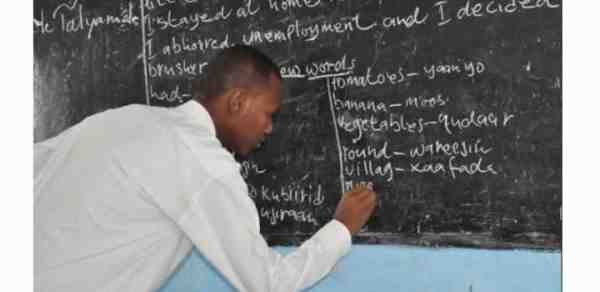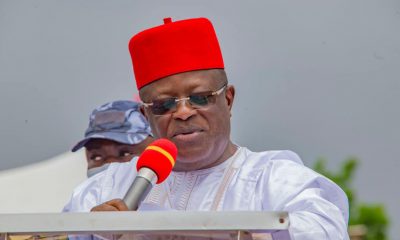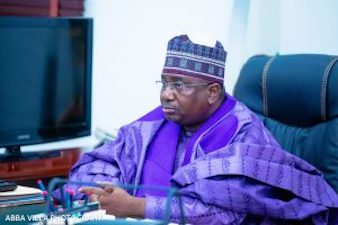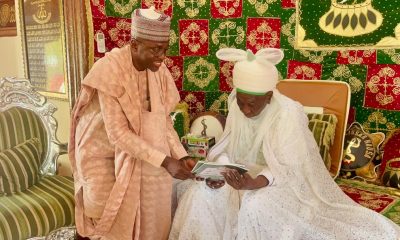Education
Payment for Revitalisation of Tertiary Institutions Underway – Minister

The Minister of Education, Prof.Tahir Mamman says payment for the revitalisation of the tertiary institutions in the country is underway.
Mamman also said the Federal Government had approved the payment of salary increase of 35 per cent to academic and 25 per cent to non-academic staff in further commitment to their welfare.
He said this in Abuja on Monday at an event to mark the 60 years anniversary of Committee of Vice Chancellors of Nigerian Universities (CVCNU).
The minister also challenged the committee to place Nigerian universities among global institutions that use science and technology as vehicles for solving their problems.
He also said that with regards to energy, steps had been taken to power the universities through gas-powered facilities using the PPP window provided by the government.
“The scheme is intended to start with 18 universities in the first instance and the shortlisted universities will be contacted appropriate stage of the project.
“The centrality of the power to service delivery, research and cost savings cannot be over emphasised.
” Due to the recognition of the centrality of the education sector, a committee was set up to provide a roadmap to guide policy, provide implementation plans, deliverables, key performance indicators (KPIs).
“And timeline was put in place and that the report of the committee is expected to be submitted this month,” he said.
He noted that arrangements had been concluded for a meeting with heads of key security outfits to review and enhance the security cover of the schools.
He added that the role of government is to continue to support the public sector universities with appropriate resources while encouraging the proper development of the private universities that are now in the greater numbers.
He however urged Nigerian universities to produce competent and skilled graduates as they are expected to tap, explore and exploit other sources of funding to run the system as the convention globally to support government funding.
“The government is also keenly interested in having a stable academic calendar for appropriate learning, research, collaboration and student exchange to take place,” he added.
Celebrating 60 years of existence, the minister called on the committee to do more to bridge the gap between industries and the institutions through their leadership.
Meanwhile, the President, Academic Staff Union of Universities (ASUU), Prof. Emmanuel Osodeke, said the problem of godfatherism had entered the university system causing big crisis.
Osodeke said universities should be run the way it should just like in the 60s and 70s where there was little or no interference from the government officials.
According to him, there is need to unbundle the stranglehold of the bureaucrats on Nigerian university system and let them run the way they were run in the past.
“We must take our universities to the uni-versatility of universities not to region universities,” he said.
The ASUU chairman explained that the university first generation lecturers are those with first class and second class upper who want to be lecturers even when they had opportunities to be in banks.
He said the then lecturers preferred to lecture than other jobs, saying those in second generation are those with same grade with first generation but for quest for money they left saying they don’t belong there and don’t want to be slaves.
He further said the third generation lecturers are those with third class and HND who went for post-graduate diplomas before entering into the university system through god-fatherism while the fourth are those who long to make money from the system.
“Unfortunately when the first and second generation of lecturers are retiring and leaving the country, the system is being dominated by third and fourth generation of lecturers,” he said.
He said universities no longer follow the process of advertising and letting people apply for the positions and get interviewed to get into the university but rather they come in through god-fatherism.
“Today, before a vice-chancellor can employ any lecturer, he has to go and get permission from the Head of Service (HOS) and when he employs, he has to go to the Accountant-General Office to beg for people employed to be paid salary.
“How can we run a system like that? We should be sad, there is nothing to celebrate.
“Our job as vice-chancellors are online, there is need for unbundling of the stranglehold of the bureaucrats on Nigerian university system,” he said.
Osodeke also decried the state of inadequate lecturers and funding in the system, saying, the least budget for education in Africa is 12 per cent; but in Nigeria it was 3.8 per cent in 2022.
The Chairman of CVCNU, Prof. Lilian Salami, said the event was out to discuss the gains, value which the committee had added to the system and its challenges.
Salami, while believing that the trajectory would change, promised to go to the drawing board and proffer solutions on the way forward to a promising university system.
“We are here to add value to the education system in Nigeria especially the tertiary education system in Nigeria.
“The gathering is not only to celebrate the 60 years anniversary or to receive or to be given but to reengineer the system so that we would have a better future and posterity will then judge us positively,” she said.
She said they never compromised in giving quality of education to Nigerian students as it is their commitment to continue to give in their best all in spite of the challenges in the system.
Also, the CVCNU Secretary-General, Yakubu Ochefu, said they expected value addition from the stakeholders while providing leadership to Nigeria university system.
“The Nigeria university system is 75 years old while globally the university system is over a thousand year old so if you put us in that time frame you will see that we are still taking baby steps.
” We are not where we use to be, we have made a lot of improvement in the system but there is room for improvement.
“We believed that now that we have open our doors to our stakeholders, they will look at us and support the system, it is not federal government alone, not the state government alone and not the people that have decided to invest in education alone but for all of us, ” he added. (NAN
Education
FG Reconstitutes Committee to Renegotiate 2009 University Agreements

The Federal Government has re-established a seven-member renegotiation committee to address the 2009 agreements with university-based unions.Minister of Education, Prof. Tahir Mamman, at the committee’s inauguration in Abuja on Monday, gave them a three-month deadline to conclude negotiations.
The committee brings together representatives from the Academic Staff Union of Universities (ASUU) and Senior Staff Association of Nigerian Universities (SSANU). Others are Non-Academic Staff of Educational and Associated Institutions (NASU), and the National Association of Academic Technologists (NAAT).Mamman stated that President Bola Tinubu’s government aimed to improve the education system and maintain peace on campuses.He noted that renegotiations began in 2017 but were delayed due to unforeseen circumstances.He said that the previous committee, led by Prof. Nimi Briggs, produced a draft report covering significant areas.The minister urged the reconstituted committee to work diligently and produce realistic agreements addressing the challenges facing the Nigerian University System (NUS).Committee Chairman, Dr Yayale Ahmed, appealed to the government to support universities in achieving global competitiveness and to consider lecturers’ salaries as investments.ASUU President, Prof. Emmanuel Osodeke, thanked the government and expressed hope that the new committee would succeed where previous ones failed.He emphasised the unions’ readiness to renegotiate, provided the government worked towards a stable academic calendar.(NAN)Education
Basic Education’s new Curriculum Commences Jan. 2025 – FG

The Federal Ministry of Education has announced that the new curriculum for basic education will commence across schools in Jan. 2025.
The Minister of Education, Prof. Tahir Mamman disclosed this on Monday in Abuja, at a stakeholders meeting on the implementation of the new curriculum.
Mamman said new curriculum for senior secondary education would also commence by Sept.
2025.He said the new curriculum would address problems of learning crises and employability.
According to him, the new skills acquisition to be introduced would have multiplier effect by equipping students with 21st century skills.
“In the last one year, we have worked with stakeholders to develop a skills framework that will inject skills right from the latter part of basic education to secondary education.
“The whole idea is that, by the time children finished, they should have a minimum of two skills so that they can have a productive life,’’ he said.
The Minister said the meeting was conveyed to discuss the modality and as well tidy some aspects of the curriculum, while also giving timeline for implementation, support, monitoring and evaluation.
He said the next three months would be used for preparatory stage. including preparing teachers guide in using the curriculum.
When asked on the difference between the new scheme and the 6:3:3:4 system of education that also infused skills, he said the problem was the inability to implement the policy.
“The major justification for what we have done has been the inability to implement the 6:3:3:4 system from inception
“The minimum academic standard of 1993 shows a reason for 6:3:3:4 and the Act outlined clearly the learning trajectory of schools in Nigeria.
“It was envisaged that by the time learners finished basic education, they would have acquired skills. Unfortunately, we departed from it,’’ he said.
The Director of Curriculum, Nigerian Educational Research and Development Council (NERDC), Dr Garba Gandu, said the new curriculum would provide prerequisite skills and training for global competitiveness.
Gandu said the curriculum is competency and digital based, as it also aligned with Science, Technology, Engineering, Arts and (STEAM) methods.
The new curriculum includes 15 newly introduced trade subjects for basic education.
The subjects are, basic digital literacy such as information technology, vocational entrepreneurship skills such as building and construction, plumbing and tiling.
Others are hospitality such as hair styling, make-up and services such as construction, GSM repairs, satellite and CCTV installation and maintenance and garment making, among others. (NAN)
Education
Zamfara Gives Reasons for Disengaging 109 Contract Teachers

The Zamfara Teachers Service Board said the recent disengagement of the 109 contract teachers by the state government was not based on ethnic, tribal or religious reasons.
The Chairman of board, Alhaji Muhammad Aliyu-Anka, stated this while speaking to newsmen in Gusau on Friday.
The state government recently announced the dismissal of 109 contracted teachers over failure to abide by the government contract policy.
“You know, the disengagement of the teachers was not on ethnic, religious or tribal reasons, it was for the interest of the state.
“You know Gov. Dauda Lawal declared a state of emergency on the education sector of the state.
“The state government embarked on massive infrastructural investment on education across the state,” Aliyu-Anka said
He said that the provision of qualified and regular teachers was necessary to achieve the government’s policy.
He said that some of the teachers had abandoned their contracts and they were teaching at private schools while still collecting salaries from the government.
Aliyu-Anka said, “The board recommended the termination of the contracts of teachers who did not abide by the rules and regulations of the state.
“Many of the disengaged teachers were not attending schools to teach, leaving volunteers to teach the pupils.”
The chairman stated that the volunteer teachers were more qualified and they were not receiving salaries from the state government.
He said,”Considering the roles played by the volunteers in our schools, the state government plans to recruit 2000 teachers to fill the gaps by the disengaged teachers.” (NAN)




















